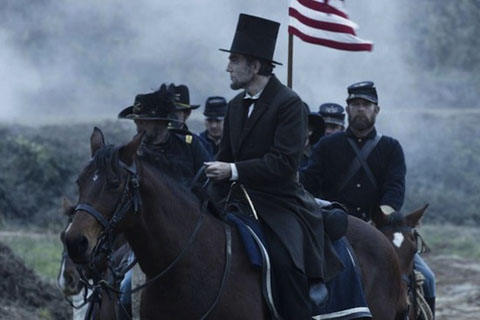
Lincoln premiered just in time for the Thanksgiving holiday. Given it was written and produced by Steven Spielberg, the film had high expectations prior to its debut. The plot revolves around Lincoln’s attempts to pass the Thirteenth Amendment in the House of Representatives at the end of the Civil War. The script is compelling and historically accurate, which helps Daniel-Day Lewis portray a realistic Lincoln. His mannerisms and demeanor bring to life the Lincoln in our mind inspired by our years of schooling. The set design, costumes, and architecture recreate an American colonial setting that is familiar to an American audience. However, these structural elements of the film are not an accessory. Rather, this attention to detail allows the viewer to become fully immersed in its traditional setting.
For me the most compelling aspect of the film was that it made no attempts to portray these revered political figures as morally superior to modern politicians. Today, we are quick to define our political climate as corrupt and polarized. It is commonplace to hear nostalgic conversations about a hopeful return to the honest practices of politicians who did the right thing. Lincoln is proof that such an era never existed.
Even though we are taught to think of Lincoln as Honest Abe, he had an agenda that required him to persuade and bribe. Over the course of the movie, he attempts to win enough support in the House of Representatives to pass the Thirteenth Amendment. He is incredibly insistent on passing the legislation in a short time frame. He knows that the abolition of slavery that the amendment calls for will not receive support from Southern delegates with their imminent surrender and readmission to the Union. Even with mostly Northern Republican representatives, Lincoln has trouble winning the support of the two-thirds majority that he needs. He goes as far as to blackmail one of the members of the House by threatening to expose his affair if he does not vote for the amendment. Several times Lincoln arranges underhanded meetings without the approval of his Secretary of State. In doing all of this, he makes evident the fact that what is best for a country, in this case ending slavery, is not always supported by a majority in the traditional democratic sense. After all, this is the reason we have a Supreme Court. They are intended to distance themselves from current public opinion in order to form decisions not influenced by modern circumstances. Although the film makes Lincoln’s quest to end slavery clear, it was not held by the other members of his party. Nevertheless, he constantly questions why his views are different.
Lincoln paints a realistic portrait of an idealized bygone time in which politicians’ and personal definitions of right and wrong were as contested and ambiguous as they are today.


